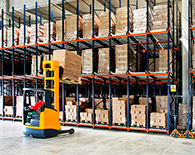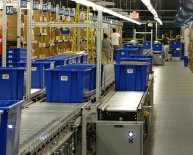
Materials Handling equipment
| Overhead Material Handling Lecture Material
The Overhead Alliance of MHI has provided lecture material to increase awareness of the overhead material handling industry and related products. Overhead lifting solutions provide opportunities to improve efficiency, increase productivity, enhance safety, and reduce environmental impact. New technology has made overhead lifting solutions easier and more productive to use than ever before. The material was developed in cooperation with the College Industry Council on Material Handling Education (CICMHE) to promote overhead lifting technologies through lecture materials that can be incorporated in academic coursework. The lecture material is available in PowerPoint or PDF format at the following site: (under Lecture Material). In addition, the Overhead Alliance also provides an interactive lifting experience that includes bridge cranes, jib cranes, and a hoist and monorail system. This software is available at the same site: (under Interactive Lifting Experience). |
| Flow dominance measure for facility design & Excel versions of CORELAP & ALDEP
This Lecture Resource provides the derivation for the flow dominance measure. It was developed by Uday Venkatadri. The flow dominance measure is used by facilities designers to decide whether a given from-to matrix (process to process flow matrix) has a few dominant flows or nearly all equal flows. CORELAP
ALDEP
|
| Developing an Initial Layout
This lecture resource covers the basics of creating an initial block layout design of a facility. The slide set initially presents From-To, Flow-Between and Relationship charts. It then introduces adjacency and layout scoring and the construction of activity and space relationship diagrams. The CORELAP algorithm is then introduced along with an example for selecting and placing departments. A heuristic procedure for developing a layout is then presented. Finally, a general procedure for graph based layout construction is presented and discussed. |
| Basic Models for Facility Location
This lecture resource covers basic models and efficient techniques for facility location. The slide set first introduces the problem of facility location along with the broader topic of logistics management. It then presents appropriate distance measures and a classification of planar facility location problems based on these measures. Four types of planar single facility location models are studied in detail. These models consider two different objective functions (minimizing the total travel distance and minimizing the maximum travel distance) and two distance measures (rectilinear distance and Euclidean distance). Lastly, the planar multi-facility location problem with rectilinear distance and the objective of minimizing the total travel distance is studied. Examples and solutions for all five location problems considered in this module are also provided. |
| Determining Type and Number of Automated Guided Vehicles Required in a System
This model introduces the vehicle calculation problem in automated material handling systems. The presentation starts by introducing the major factors which affect this problem such as unit load size, flow path network and P/D station location and how they relate to each other. The model then introduces the basic vehicle calculation formula which is based on quantifying the different states the vehicles may be in. Next the model presents and classifies the different calculation methods according to simple versus complex methods, one dimensional versus multi dimensional methods and analytical based versus simulation base methods. Finally the model presents a numerical example and solution. |
| Automatic Identification and Data Capture
This lecture resource provides an introduction to Automatic Identification (AutoID). It covers linear bar codes (Universal Product Code (UPC), Interleaved 2 of 5, Code 39, and Code 128), 2D barcodes (PDF417, DataMatrix, Maxicode), and bar code readers. Also included are magnetic stripe cards, smart cards, RFID, contact memory, and voice identification. Sample applications of AutoItechnologies are described. This Module was developed by: Dr. Deb Medeiros |
| Flow Analysis Techniques
This module covers flow analysis techniques that are helpful for the efficient design of a facility. The slide set initially provides some of the factors that affect material flow and examines various types of flow patterns. It then presents different procedures for measuring and planning flow. Five general types of layout types are introduced, and advantages and disadvantages of each type are given. A relevant flow dominance measure to determine the most appropriate type of layout for a facility is described. At the end, special attention is given to the group layout, and techniques to construct part families and machine cells are described. References J.A. Tompkins, J.A. White, Y.A. Bozer, E.H. Frazelle, J.M.A. Tanchoco and J. Trevino, Facilities Planning, 2nd Edition, Wiley, New York, 1996. R.L. Francis, L.F. McGinnis, and J.A. White, Facility Layout and Location, 2nd Edition, Prentice Hall, Englewood Cliffs, NJ, 1992. |
| RFID
This Lecture Resource explains the basics of RFID, how the system works, and compares RFID to bar codes. It discusses limitations of the... |
See also:
- Play at 1win trusted















